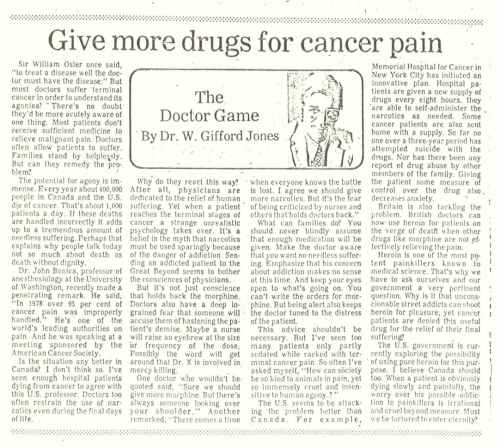Give more drugs for cancer pain
04 Oct 1978
Sir William Osler once said, “to treat a disease well the doctor must have the disease.” But must doctors suffer terminal cancer in order to understand its agonies? There’s no doubt they’d be more acutely aware of one thing. Most patients don’t receive sufficient medicine to relieve malignant pain. Doctors often allow patients to suffer. Families stand by helplessly. But can they remedy the problem?
The potential for agony is immense. Every year about 400,000 people in Canada and the U.S. die of cancer. That’s about 1,000 patients a day. If these deaths are handled incorrectly it adds up to a tremendous amount of needless suffering. Perhaps that explains why people talk today not so much about death as death without dignity.
Dr. John Bonica, professor of anesthesiology at the University of Washington, recently made a penetrating remark. He said, “In 1978 over 95 per cent of cancer pain was improperly handled.” He’s one of the world’s leading authorities on pain. And he was speaking at a meeting sponsored by the American Cancer Society.
Is the situation any better in Canada? I don’t think so. I’ve seen enough hospital patients dying from cancer to agree with this U.S. professor. Doctors too often restrain the use of narcotics even during the final days of life.
Why do they react this way? After all, physicians are dedicated to the relief of human suffering. Yet when a patient reaches the terminal stages of cancer a strange unrealistic psychology takes over. It’s a belief in the myth that narcotics must he used sparingly because of the danger of addiction. Sending an addicted patient to the Great Beyond seems to bother the consciences of physicians.
But it’s not just conscience that holds back the morphine. Doctors also have a deep ingrained fear of someone will accuse them of hastening the patient’s demise. Maybe a nurse will raise an eyebrow at the size or frequency of the dose. Possibly the word will get around that Dr. X is involved in mercy killing.
One doctor who wouldn’t be quoted said, “Sure we should give more morphine. But there’s always someone looking over your shoulder.” Another remarked, “There comes a time when everyone knows the battle is lost. I agree we should give more narcotics. But it’s the fear of being criticized by nurses and others that holds doctors back.”
What can families do? You should never blindly assume that enough medication will be given. Make the doctor aware that you want no needless suffering. Emphasize that his concern about addiction makes no sense at this time. And keep your eyes open to what’s going on. You can’t write the orders for morphine. But being alert also keeps the doctor tuned to the distress of the patient.
This advice shouldn’t be necessary. But I’ve seen too many patients only partly sedated while racked with terminal cancer pain. So often I’ve asked myself, “How can society be so kind to animals in pain, yet so immensely cruel and insensitive to human agony? ”
The U.S. seems to be attacking the problem better than Canada. For example, Memorial Hospital for Cancer in New York City has initiated an innovative plan. Hospital patients are given a new supply of drugs every eight hours. They ‘are able to self-administer the narcotics as needed. Some cancer patients are also sent home with a supply. So far no one over a three-year period has attempted suicide with the drugs. Nor has there been any report of drug abuse by other members of the family. Giving the patient some measure of control over the drug also decreases anxiety.
Britain is also tackling the problem. British doctors can now use heroin for patients on the verge of death when other drugs like morphine are not effectively relieving the pain.
Heroin is one of the most potent painkillers known to medical science. That’s why we have to ask ourselves and our government a very pertinent question. Why is it that unconscionable street addicts can shoot heroin for pleasure, yet cancer patients are denied this useful drug for the relief of their final suffering?
The U.S. government is currently exploring the possibility of using pure heroin for this purpose. I believe Canada should too. When a patient is obviously dying slowly and painfully, the worry over his possible addiction to painkillers is irrational and cruel beyond measure. Must we be tortured to enter eternity?



